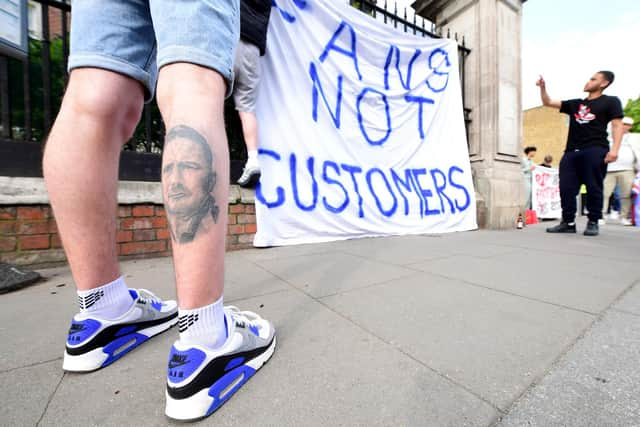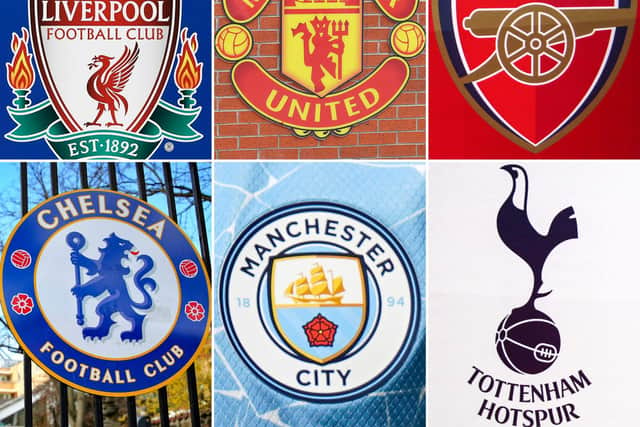What action can government take to protect football from breakaway leagues - from fan-ownership models to windfall taxes
and live on Freeview channel 276
In a turbulent 48 hours for football, all six English clubs who signed up for the European Super League have withdrawn from the controversial breakaway competition.
It came as the football community were united in its disapproval of ESL plans to form a tournament which handed entry to 15 of the game’s biggest clubs from Europe.
Advertisement
Hide AdAdvertisement
Hide AdCritics ranged from fans, players and managers to administrators, pundits and politicians who came together to oppose the ESL, described as “pure greed” by Gary Neville.


Others joined the former Manchester United defender in pointing the finger at the owners of the Premier League’s ‘big six’, as ministers threatened to block the ESL from happening.
United, Arsenal, Chelsea, Liverpool, Manchester City and Tottenham Hotspur all received widespread criticism for signing up for the ESL project which has long been talked about.
Despite the English clubs' exit, the ESL vowed to “reshape the project” in a statement and the league’s head Florentino Pérez remained committed to a new-look competition.
Advertisement
Hide AdAdvertisement
Hide AdIt appears unlikely that this is the last we’ve heard of a breakaway European league - so what measures can the government take to protect the beautiful game from other threats?


Stephen Taylor Heath, Head of Sports Law and Partner at JMW Solicitors, explains all…
Punishments
Culture secretary Oliver Dowden mooted various punishments, sanctions, and prohibitions he believed could have been imposed on the ESL breakaway clubs.
It’s clear his mission statement was to prevent the ESL coming to pass - but would the government have imposed such sanctions if the competition had gone ahead?


Advertisement
Hide AdAdvertisement
Hide AdThe situation was similar to the contrasting effects of a hard or soft Brexit - a concept understood by the government, of course.
Would it have been a hard Brexit, where the six English clubs are banned from the English Premier League (EPL) and players banned from international football, or a soft Brexit, where compromise is reached and the ESL is accommodated by the domestic leagues, so the only net effect is that the ESL replaces (or coexists with) the Champions League?
In general the courts and government are reluctant to interfere in ‘sporting matters’ on the basis that sport should ‘self-govern’. The government can legitimately get involved where a sport is reliant on public money such as lottery funding where a condition of such funding is a certain level of competent self-governance.
Here the government would undoubtedly be taking sides and potentially interfering in the commercial interests of the breakaway clubs, which might have included their contractual commitment to the organisers of the ESL.
Advertisement
Hide AdAdvertisement
Hide AdThey would also be interfering in the employment contracts and prospects of players participating.
In terms of the measures mooted by Mr Dowden, the following aspects spring to mind:
Introducing German-style fan-ownership
Over the years there have been several attempts to create such ownership structures.
Several clubs already have supporters’ trusts holding stakes in clubs but invariably it has not resulted in an entirely fan run club.
Advertisement
Hide AdAdvertisement
Hide AdImposing fan ownership rather than private ownership may level the playing field but there are always ‘fans’ and ‘wealthy fans’.
Windfall tax on the breakaway clubs
The Government is generally adverse to ‘wealth taxes’ but it is anticipated the clubs would scrutinise any legislation that made this possible.
Commercially, given finance is driving breakaway clubs, paying a higher rate of tax on a vastly increased revenue share would be unlikely to be a deterrent.
Fewer work permits to prevent signings of players from abroad
Advertisement
Hide AdAdvertisement
Hide AdIt is anticipated legal advisors of foreign players wishing to join ESL clubs would recite Human Rights legislation as well as potentially seeking a judicial review of any rejections based on such criteria.
Barring foreign players from traveling to England
Given the legal objections under employment law to the idea of restricting the number of foreign players in a club’s squad on the grounds it gave homegrown talent more opportunity, the same would apply if such caps were imposed purely on ESL clubs.
Blocking ESL clubs from playing in England
Football in England is controlled by the Football Association (FA), the English Football League (EFL) and the English Premier League (EPL).
They coexist and collaborate with UEFA and FIFA to secure a gap in the playing season to accommodate the various competitions they oversee.
Advertisement
Hide AdAdvertisement
Hide AdThey have authority over the clubs based on the clubs’ participation.
If the clubs leave they lose authority. The government would perhaps only become involved if the relevant governing bodies felt unable to regulate the issue themselves.
Investigating ESL plan’s compliance with competition law
The shadow home secretary called the ESL an anti-competitive cartel.
The basis for that is that entry into the league is not earned from performance in lower leagues, save for the five places each year for non-founder members.
Advertisement
Hide AdAdvertisement
Hide AdFurther, that potentially means the vast majority of broadcast rights fees will be diverted to the ESL from domestic leagues. Such comments ignore the fact the ESL is backed by JP Morgan and driven in part by US-based owners.
The major US sports are run on a franchise model with no relegation and entry is procured by acquiring a franchise not promotion. In some respects a criticism of the ESL structure is a criticism of the US sports model.
Withdrawing police support from matches
This would be the most troubling sanction as surely public safety concerns outweigh any other?
Breakaway clubs would have had to organise alternative security in order to meet health and safety requirements. If the ESL does proceed and the government does have fans’ interest at heart this should not be one of the sanctions being considered.